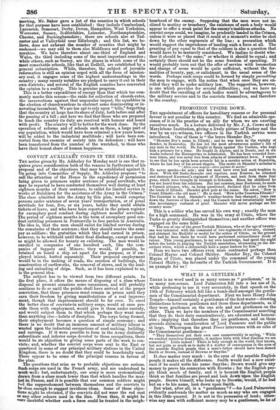PROMOTION UPSIDE DOWN.
THE appointment of officers for hereditary reasons or for personal favour is not peculiar to this country. We find an admirable spe- cimen of it in the practice of an ally for whom we are exerting ourselves much. In a lecture delivered by Mr. I. A. Crowe at the Marylebone Institution, giving a lively picture of Turkey and the war by an eye-witness two officers in the Turkish service were introduced. One of these is " the brave Skender Bey." " Skender Bey's name is Illinski ; and be was born in the vicinity of Bender, in Bessarabia. He has led the most adventurous soldier's life of any man in the world. He fought in Spain against the Carlista, who kept him a prisoner for a time. He fought in Algiers, and in Bosnia, and in six weeks reduced the Herzegovina to submission. He has been wounded four- teen times, and was never free from attacks of intermittent fever. I regret to see that he has again been severely hit in a cavalry action at Eupatoris, where he lost four of his sword-fingers. The motto on Skender's scimitar's " • Altra eon morire—altra parlare di mode:- He never speaks—he acts ; and few men have ever had such trophies to show. With 800 Bashi-Bazouks and regulars, near Kraiove, he attacked and destroyed Karamsui's regiment of Hussars, and took from them four guns, which were brought in triumph to Schumla. Since his childhood he has not heard from his relations. But last summer, near Bucharest, he made a Cossack prisoner, who, on being questioned, declared that he came from the lands of Illinski. Skender grew pale at the name. He asked, How is Count Illineki—the old man ?' He is dead. How is the ComiteseIllinski ?' The Countess is dead. Skender's weather-beaten face changed; tears ran down the furrows of his cheek ; and the Cossack bowed reverentially before this involuntary outburst of grief. Skender will never perhaps see his country more."
This is a soldier who has carved his own way ; exactly the man for a high command. He was in the army at Citate, where the Turks so greatly distinguished themselves; and another officer was
engaged on the same field- . The son of one of the great Turkish Ministers, who at the age of twenty- one was intrusted with the command of two regiments of cavalry, claimed and obtained the Medjidid or medal for the action of Citate, on the ground that had he been there he would have performed extraordinary deeds of valour. This young gentleman, to my own knowledge, had spent the night before the battle in playing the Turkish mandoline, strumming on the dis- cordant wires, whilst a chibouckdji held a paper lantern for him."
Here we have two officers even more contrasted perhaps than Colonel Mayne and Colonel Shirley. Skender Bey, the Colonel Mayne of Citate, was placed under the command of the young Colonel Shirley, the favourite of the Turkish Government. It is an example for us


























 Previous page
Previous page